
International Journal of Care Coordination
Scope & Guideline
Pioneering insights into care coordination excellence.
Introduction
Aims and Scopes
- Care Coordination in Diverse Populations:
The journal explores care coordination across various populations, including children with special needs, frail elderly patients, and individuals with chronic conditions, highlighting the unique challenges and strategies relevant to each group. - Interprofessional Collaboration:
A significant focus is placed on the roles and contributions of different healthcare professionals in care coordination, aiming to improve collaboration between disciplines to enhance patient outcomes. - Implementation and Evaluation of Care Models:
The journal features studies that evaluate existing care coordination models and propose new frameworks, emphasizing evidence-based practices and innovative approaches to improve healthcare delivery. - Patient-Centered Care Approaches:
Research articles often emphasize the importance of patient perspectives in care coordination, advocating for strategies that prioritize patient needs, preferences, and experiences. - Technology and Care Coordination:
The role of health information technology and digital tools in facilitating care coordination is a recurring theme, exploring how these tools can enhance communication and streamline processes in healthcare settings.
Trending and Emerging
- Navigational Support for Patients:
There is a growing emphasis on patient navigation programs, particularly for vulnerable populations such as low-income older adults and individuals with complex care needs, highlighting the importance of dedicated support in healthcare transitions. - Impact of Social Determinants on Care Coordination:
Recent studies are increasingly exploring how social determinants of health influence care coordination outcomes, stressing the need for holistic approaches that consider patients' social contexts. - Health Technology Integration:
The integration of technology in care coordination practices is a rising theme, with research focusing on how digital tools and health information systems can enhance communication and streamline care processes. - Qualitative Research Methodologies:
There has been a notable increase in qualitative research aimed at understanding patient and provider experiences within care coordination, providing deeper insights into the complexities of care delivery. - Focus on Rural Health and Access Issues:
Emerging studies are addressing the unique challenges of care coordination in rural settings, where access to healthcare services can be particularly limited, emphasizing innovative solutions tailored to these communities.
Declining or Waning
- Traditional Care Models:
There has been a noticeable decrease in publications centered around traditional, siloed care models. The shift towards integrated care approaches suggests a waning interest in discussing models that do not prioritize collaboration and patient-centeredness. - General Health Policy Discussions:
Research focused solely on broad health policy without a direct linkage to care coordination practices has become less frequent, indicating a movement towards more specific, actionable insights within the realm of care coordination. - Single-Discipline Perspectives:
Papers emphasizing the roles of single healthcare professions without integration into a broader care coordination framework have decreased, highlighting a trend towards interdisciplinary research. - Fragmented Care Issues in Non-Chronic Conditions:
There is a declining focus on fragmented care issues that do not involve chronic conditions or complex cases, as the journal increasingly emphasizes coordination in complex healthcare scenarios.
Similar Journals

FAMILY PRACTICE
Transforming family medicine with impactful research.FAMILY PRACTICE is a premier peer-reviewed journal dedicated to advancing the field of family medicine, published by Oxford University Press. Established in 1984 and continuing its influential discourse into 2024, the journal holds an esteemed position in the academic community, as evidenced by its classification in the Q1 quartile for Family Practice, ranking 10th out of 56 in this category according to Scopus. With an impressive impact factor and a commitment to disseminating high-quality research, FAMILY PRACTICE serves as an essential resource for researchers, clinicians, and students alike, striving to enhance practice and education in family medicine through evidence-based insights and innovative practices. While the journal maintains a traditional subscription model, it supports broad dissemination of knowledge that contributes significantly to the evolving landscape of healthcare in the United Kingdom and beyond.
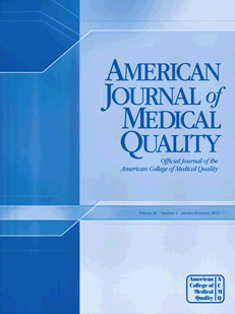
AMERICAN JOURNAL OF MEDICAL QUALITY
Driving Innovation in Healthcare Delivery and PolicyAmerican Journal of Medical Quality is a pivotal publication in the field of healthcare quality and medical policy, published by Lippincott Williams & Wilkins. Since its inception in 1992, the journal has become a critical resource for researchers, practitioners, and students dedicated to improving patient care and health systems through evidence-based practices. With a current impact factor that reflects its significance in the arena of medicine and health policy, the journal falls within the Q3 category in both Health Policy and Medicine (Miscellaneous) as of 2023, ranking 253rd out of 636 in general medicine according to Scopus metrics. This underscores its relevance and prominence among peers. The journal's scope encompasses a diverse range of topics related to quality improvement initiatives, healthcare delivery systems, and policy analysis, making it an essential read for anyone invested in advancing medical quality standards and practices. While it is not an open-access journal, the content is meticulously curated to enrich the academic discourse and inform best practices in medical quality. With an ongoing commitment to addressing contemporary challenges in healthcare, American Journal of Medical Quality serves as an influential platform for advancing the knowledge and implementation of quality initiatives in medical settings.
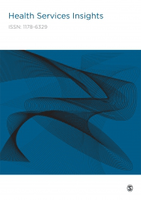
Health Services Insights
Bridging gaps in health knowledge for all.Health Services Insights is a prestigious, open-access journal published by SAGE Publications Inc. Based in the United Kingdom, this journal has become a vital resource for researchers and professionals in the fields of Health Policy and Public Health. Since its inception in 2008, Health Services Insights has consistently aimed to disseminate high-quality, peer-reviewed research that informs practice and policy in health service delivery and management. With an impressive Q1 ranking in both its categories as of 2023, and a respectable Scopus ranking positioning it within the upper percentiles of its fields, the journal continues to attract influential contributions from global experts. Its open-access format, established in 2013, ensures that vital insights on health services are accessible to all, facilitating knowledge sharing and collaboration among researchers, practitioners, and students alike. By focusing on impactful research and innovation, Health Services Insights plays a crucial role in addressing contemporary challenges in health services and improving health outcomes worldwide.

Health Care Management Science
Shaping the future of health care through academic rigor.Health Care Management Science, published by Springer, is a leading journal dedicated to advancing the fields of health care management and medical administration. With an impressive impact factor reflecting its strong academic influence and a Q1 quartile ranking in both Health Professions and Medicine categories, it stands out as a valuable resource for researchers, professionals, and students interested in optimizing health care systems. The journal, with its ISSN 1386-9620 and E-ISSN 1572-9389, features a variety of original research articles, case studies, and theoretical insights aimed at addressing contemporary challenges in health care. Spanning from 1998 to 2024, it continues to play a pivotal role in disseminating knowledge and best practices that enhance health care delivery and management strategies. Although it does not currently offer open access, its rigorous peer-review process ensures the publication of high-quality content that contributes significantly to the academic community and beyond.
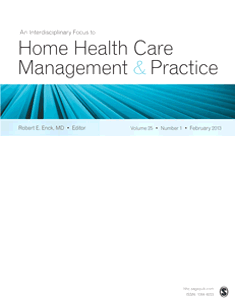
Home Health Care Management and Practice
Advancing Excellence in Home Health Care ManagementHome Health Care Management and Practice, published by SAGE Publications Inc., is an esteemed journal dedicated to advancing the field of home health care management through rigorous research and thought-provoking commentary. Established in 1988, this scholarly publication has become a critical resource for professionals, researchers, and students interested in the dynamics of community care and home health services. With an impact that reflects its commitment to quality, the journal holds an impressive standing, achieving a Q2 ranking in Community and Home Care and a Q3 ranking in both Leadership and Management and Public Health, as of 2023. The journal operates without open access, ensuring that its contributions are housed within an esteemed academic framework. Covering key areas such as nursing, leadership strategies, and occupational health, it serves as an essential platform for disseminating knowledge, fostering collaboration, and influencing best practices in the field. The journal's targeted focus empowers its readers to stay at the forefront of emerging trends and evidence-based practices, making it a vital asset for anyone involved in the evolving landscape of home health care.
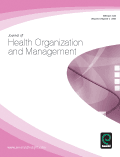
Journal of Health Organization and Management
Navigating complexities in health organizations for a better tomorrow.The Journal of Health Organization and Management, published by Emerald Group Publishing Ltd, serves as a pivotal resource for professionals, researchers, and students interested in the intersection of health policy and organizational effectiveness. With an ISSN of 1477-7266 and an E-ISSN of 1758-7247, this esteemed journal has been charting advancements in health management since 2003, showcasing articles that reflect rigorous research and the latest trends in the field. Hailing from the United Kingdom, the journal has established itself within the upper echelons of academic literature, currently enjoying a Q2 classification in notable categories, including Business, Management, and Accounting, Health Policy, and Organizational Behavior and Human Resource Management, as of 2023. With impressive rankings in Scopus, including a percentile rank in the 62nd for Business and Management, it is an essential platform for disseminating innovative ideas and evidence-based findings crucial for enhancing health care systems globally. While it operates under a conventional access model, the journal remains dedicated to fostering scholarly dialogue and advancing the understanding of health organization complexities.
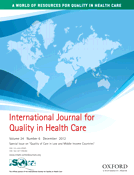
INTERNATIONAL JOURNAL FOR QUALITY IN HEALTH CARE
Empowering policymakers with pivotal healthcare research.INTERNATIONAL JOURNAL FOR QUALITY IN HEALTH CARE, published by Oxford University Press, stands as a pivotal resource in the domains of Health Policy, Medicine, and Public Health. With an ISSN of 1353-4505 and an E-ISSN of 1464-3677, this journal has been a cornerstone for quality assessment in healthcare since its inception in 1989, evolving through to 2024. Holding a respected position in the academic community, it is classified in the Q2 category across multiple fields including Health Policy and Environmental Health, reflecting its significant impact as evidenced by its Scopus rankings (Rank #74/310 in Health Policy, Percentile 76th). Though it operates under a subscription model, the journal aims to disseminate pioneering research aimed at improving healthcare quality globally, providing insights that are invaluable for researchers, practitioners, and policymakers alike. With a commitment to enhancing public health landscapes, the journal continues to influence practices and outcomes in a rapidly changing health environment.
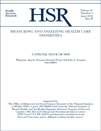
HEALTH SERVICES RESEARCH
Advancing health policy through rigorous research.HEALTH SERVICES RESEARCH, published by Wiley, is a premier journal focused on advancing the field of health policy and services research. With an ISSN of 0017-9124 and an impressive E-ISSN of 1475-6773, this esteemed publication has been at the forefront of health services inquiry since its inception in 1966. Recognized as a Q1 journal in Health Policy for 2023, it ranks #80 out of 310 in Scopus, placing it in the 74th percentile, underlining its significant influence in the field. The journal caters to a global audience of researchers, practitioners, and students by providing a platform for rigorous empirical studies and critical reviews that aim to improve health care delivery and policy outcomes. Although it does not offer open access, the comprehensive articles and insights published within its pages are essential for anyone seeking to understand and influence health systems. With its convergence towards the year 2024, HEALTH SERVICES RESEARCH continues to be a vital resource for those dedicated to enhancing healthcare effectiveness and accessibility.

International Journal of Integrated Care
Connecting disciplines to enhance integrated care practices.International Journal of Integrated Care (ISSN: 1568-4156, E-ISSN: 1568-4156) is a highly regarded scholarly journal published by UBIQUITY PRESS LTD in the Netherlands. As an Open Access journal since 2000, it fosters knowledge dissemination in a variety of domains including health policy, sociology, and political science. With a commendable standing reflected in its Q1 quartile rankings across Health Policy, Sociology and Political Science, and Health (Social Science) for 2023, the journal ranks in the top percentile of its respective fields according to Scopus. Researchers and professionals are encouraged to engage with the journal's comprehensive analyses and innovative approaches that address pressing issues within integrated care systems, making it an essential resource for students, practitioners, and academics alike. The journal not only promotes interdisciplinary dialogue but also contributes to global efforts in enhancing health care systems through robust research and critical insights.

BMC Family Practice
Exploring the heart of family medicine for better health outcomes.BMC Family Practice is a premier open-access journal dedicated to the field of family medicine, published by the renowned BMC since its inception in 2000. With a focus on disseminating impactful research and innovations in primary care, this journal has firmly established itself within the vibrant domain of family medicine, earning a Scopus rank of #9 out of 42 in its category, placing it in the top 21% of the field. The journal provides a platform for researchers, practitioners, and students to explore the latest findings, clinical practices, and advancements related to family and community healthcare. Accessible freely to an international audience, BMC Family Practice is a vital resource for anyone committed to enhancing healthcare delivery and understanding the nuances of family health dynamics, facilitating collaborative efforts towards improving health outcomes in diverse populations.